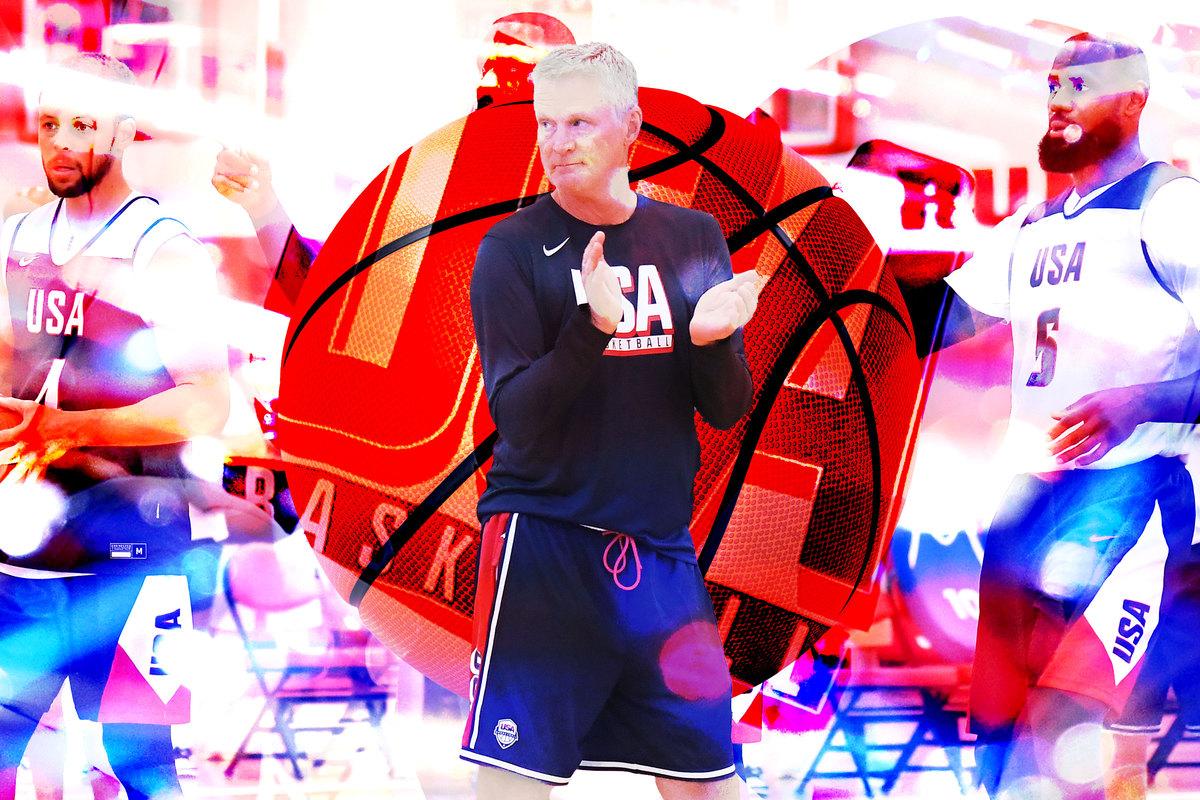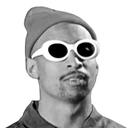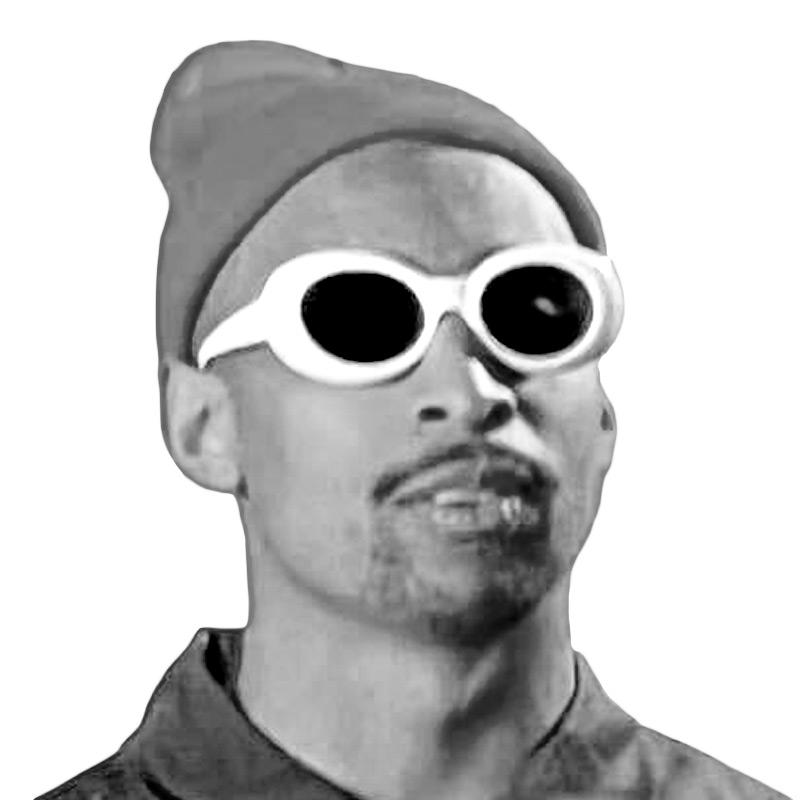
Steve Kerr has been around plenty of superstars in his career. He’s played alongside Michael Jordan and Tim Duncan, played for Phil Jackson and Gregg Popovich, and coached Steph Curry and Kevin Durant. But even he was struck by the caliber of players all around him this past weekend as Team USA convened for its first practice of the summer on the UNLV campus.
“They’re Hall of Famers,” he said, smiling. “It’s remarkable to see the talent in front of me as I’m addressing the team.”
As Kerr spoke to the assembled media, Anthony Edwards was on the far end of the court, cracking jokes as he watched LeBron James shoot free throws. Forty feet to Edwards’s left, Curry was practicing 3-pointers, wincing every time the ball didn’t go perfectly through the net.
The star-studded roster heading to Paris for the Summer Olympics will also include Kevin Durant, Jayson Tatum, Anthony Davis, Devin Booker, Bam Adebayo, and Jrue Holiday, all of whom won golds in past years; Tyrese Haliburton, a standout from last year’s FIBA World Cup; and Joel Embiid and Kawhi Leonard, who will make their USA debuts. Combined, the team accounts for 14 gold medals in major international competition.
“This is one of the most unique and special gatherings of talent that USA Basketball has ever had,” Kerr told me by phone last month. “Probably right up there with the ’92 Dream Team when you think of the star power.”
Kerr, a USA assistant under Popovich for the Tokyo Olympics before taking over the head job last year, did little to impress in his international coaching debut at the 2023 world championships in Manila. A U.S. team of younger players with no senior-team experience finished fourth, marking just the third time the Americans failed to medal in the 30 years since it began using professional players.
With his contract ending following the 2024 Olympics, this trip is expected to be the last of Kerr’s brief tenure as head coach of Team USA—his own personal Last Dance, amid one final run for luminaries like LeBron and Durant and Curry. But Kerr’s vast experience playing alongside and then coaching some of the best players and biggest personalities in the game may make him uniquely suited for the task ahead. The U.S. has assembled a historic collection of talent, but it’s up to Kerr to carve out a team—a rotation, a game plan—that can bring home gold against a more competitive international field.
“Our big thing is taking this talent,” Kerr said over the weekend, “and helping them figure out how to be a team, and be prepared for what is undoubtedly an enormous challenge.”
When Mike Brown joined the Golden State Warriors coaching staff as Kerr’s lead assistant in the summer of 2016, he assumed the head coach would have final say on all on-court decisions. So as the games began, Brown started to ask permission to implement his strategy, much to Kerr’s chagrin.
“I ran the defense and I literally could have changed defenses or defensive coverages at any point during the game,” Brown told me. “And Steve would never question it. He’s like, ‘Mike, don’t ask me to do this or do that. You just do it.’”
Eventually, Brown heeded the message, and Golden State finished below 14th in defensive rating only once during his six-year tenure. But more importantly, Brown began to realize that if everyone in the building feels a sense of equity in the process, there’s no limit to what a team can do.
“He’s extremely collaborative,” Brown said. “Not just with his staff but with his players, too. He gives them ownership of the process. And if a player or a group of players has ownership in any process that you’re going through, they’re going to give it that much more to make it work.”
Kerr has brought the same mindset to Team USA—as well as an accomplished coaching staff: Tyronn Lue and Erik Spoelstra, both of whom have won NBA titles as head coaches; and Mark Few, one of the college game’s most accomplished coaches. Scrimmages in Las Vegas feature multiple voices sharing opinions on how to make the team better. Assistant coaches have agency to make adjustments, and players are encouraged to share their thoughts.
“He doesn’t feel like there’s one in charge,” Booker said this past weekend. “They let each other have their own segments and he’s just—it’s just an honor to play for him. He’s a player’s coach.”
And in James, Kerr has a coach on the floor. Over the years, LeBron has been a friendly foil, competing against Kerr’s Warriors in the NBA Finals four straight seasons, and later, as a division rival. The thought of James brings up nightmares of playing against him. “Playing him in the Finals all those years,” Kerr told me. “You realized, quickly, ‘All right, when I drop this ATO, I got to try to get him away from the action, I’ve got to remove him from the picture because he’s going to muck everything up. … If you want to use an f instead of an m, you’re welcome to do that.”
Outside of competition, Kerr and James’s encounters have been confined to brief pregame pleasantries and occasional banter. But since this past season ended, Kerr has made a point to foster a relationship with James, exchanging texts on schemes and stories of yesteryear. During scrimmages, James has become Kerr’s eyes and ears on the floor, calling out defensive coverages, getting players in position to flourish, and making Kerr’s life as easy as possible.
“We do a defensive drill, his voice is booming through the gym—‘Help! Help! Help!’” Kerr told me after day two of practice. “Whatever the instruction is. Sprinting through every drill, going all out on every drill. He’s also a stickler for being on time, and getting things rolling. Spo and Ty both told me he would be like this, just really easy to coach in that regard. That he would do everything we asked. But it’s one thing to hear it, and it’s another thing to see it.”
The visual brings Kerr memories of another notable player he’s coached.
“He reminds me a lot of Draymond defensively,” he says. “Where behind the play he’s incredibly perceptive, loud, communicative. He’s perfect for FIBA, because he’s so good not only switching on the ball but switching away from the ball, and reading what’s happening, and bumping guys off the play, and protecting his teammates. Just an incredible basketball mind.”
The embarrassment of riches in talent will force Kerr to make many difficult decisions regarding roles and playing time. Edwards, 22, is the youngest player on the roster, and has only last year’s World Cup under his belt on the international stage. But that hasn’t deterred his confidence—or his expectations about his role. “I’m still the no. 1 option,” he said. “Y’all might look at it differently; I don’t look at it differently. Hey, I just go out there and be myself, shoot my shots, play defense. They got to fit in to play around me.”
As of Tuesday morning, on the eve of Team USA’s opening exhibition match against Canada, Kerr still hasn’t set a starting lineup—a stark contrast to the international competition they’ll face, some of which have been playing together for years. But Kerr has had more experience than most with balancing opportunities for superstars, including with two players on the U.S. roster: Curry and Durant.
“Can’t wait,” Kerr said when asked about the opportunity ahead of camp. “Those guys were so good together during that three-year run.”
But success didn’t necessarily mean a smooth working relationship between Durant and Kerr. Throughout his final season in Golden State, Durant frequently bickered privately about his role in Kerr’s offense. Durant made his feelings public in 2019, when he told The Wall Street Journal that Kerr’s offense lacked creativity.
The animosity thawed, but the two barely spoke the following season as Durant (after signing with the Brooklyn Nets) recovered from a torn Achilles tendon. A reunion at the Tokyo Games brought them back together, and Kerr now cherishes the chance they had to reconnect.
“I know there was lots of drama when he left,” Kerr said, referring to the constant speculation about Durant’s departure during his final season in the Bay. “And that’s all behind us. But as a basketball player, he’s one of the smoothest, most talented players I’ve ever been around—and not just his skill and his talent, but his ability to play with other people. His game just allows him to fit any combination.”
During last year’s world championships, Kerr struggled to find the right lineups among a roster of mostly up-and-coming players. A loss to Canada in the bronze-medal game led to criticisms about Kerr’s substitution patterns and questions about whether the world had finally caught up to America on the global stage.
“I wish we had put more physical combinations on the floor,” Kerr told me. “I think we lost three games during that run, and all three games we just were not able to corral our opponents defensively, and it was the physicality, the rebounding. We fouled too much. When you’re the coach, then you’re responsible for that, and so I’ve got to do a better job of that, our staff has to do a better job of that this summer of making sure we’re physical enough, and defensive-minded enough to get stops at key times, because that’s what’s going to determine winning and losing.”
To prioritize defense this time around, the choice will be between which perennial Defensive Player of the Year candidate he wants to put at center, or which living legend he wants at the point of attack—the one that’s won multiple titles, a reigning title winner, or someone who is expected to compete for titles in the near future.
Overall, the roster features some of the very best players over the past two decades of basketball: The 12-man roster boasts 84 All-Star appearances and 16 combined NBA championships. For some, that would be a managerial nightmare; but Kerr, known for his laid-back attitude and ball-finds-energy approach, might be just the right coach for the job.
Thirty-two years ago, Chuck Daly was tabbed to steer a USA roster with similar star power in large part because of a similar player-friendly approach. In a 1989 Sports Illustrated feature, Jack McCallum detailed how Daly’s focus on himself ended at his world-class tailoring:
He realizes that the best NBA teams, which in this decade means the Lakers and the Celtics, are player-oriented. The players are the focus, not the coach. The players take care of most of the big problems. The coach is there to motivate, to prepare, to direct. But not to star.
The Dream Team went on to beat international opponents handily, cruising to the gold medal with a 44-point average margin of victory. But the competition awaiting this year’s Olympic squad may be stiffer than ever before. Canada is led by Shai Gilgeous-Alexander, who finished second in NBA MVP voting last season. France will pair Victor Wembanyama, the 7-foot-4 reigning NBA Rookie of the Year, and Rudy Gobert, the 7-1 Defensive Player of the Year. And Germany (the reigning World Cup champs), Serbia (powered by reigning MVP Nikola Jokic), and Australia will all bring competitive squads.
“This is not 1992,” Kerr said this past weekend. “Steph and I are not going to be like Chuck Daly and Mike. We’re not playing golf every day in France. I know Chuck and Michael had a great time together on game days, but the days of 36 holes are long gone. We have our hands full.”
But Kerr is relishing the opportunity. When he was 6 years old, he fumed after watching Team USA lose to the Soviet Union by one point in the gold-medal game at the 1972 Olympics. Since then, the U.S. has reeled off a four-decade streak of dominance, winning nine golds in 11 appearances on the Olympic stage. The rest of the world has made it its mission to catch up to the Americans, but Kerr, perhaps more than any other coach, is familiar with the pressures of great expectations.
“It’s going to be a challenge for USA Basketball every year, from here on out. That’s the beauty of the globalization of the game,” he said. “The downside is it’s a lot tougher to win a gold medal, but that makes the challenge even greater.”

